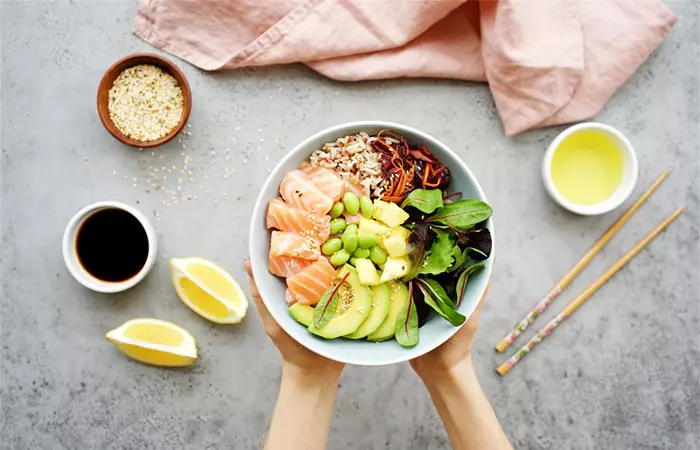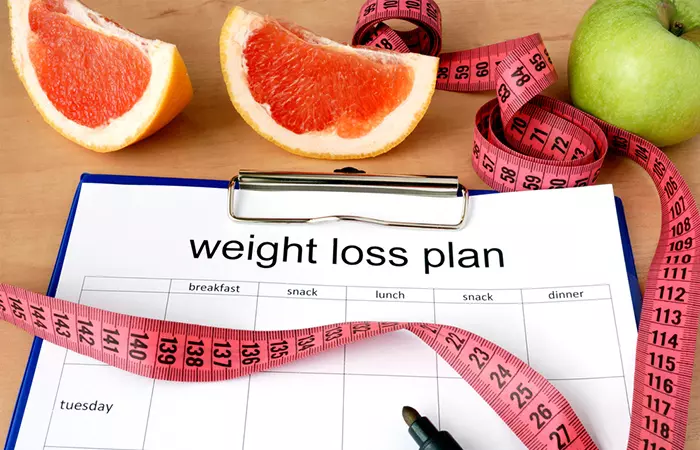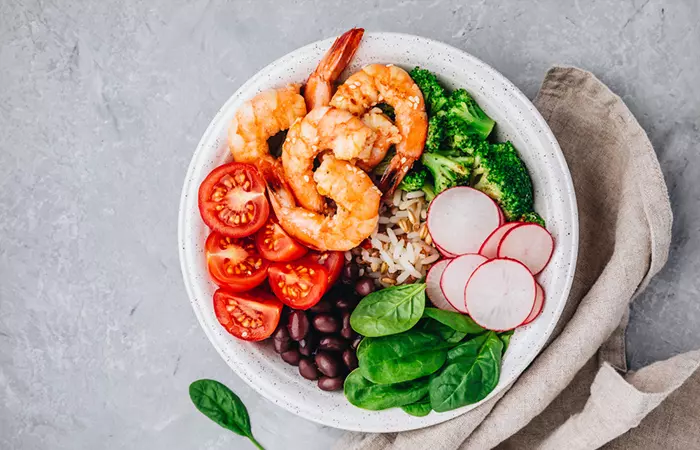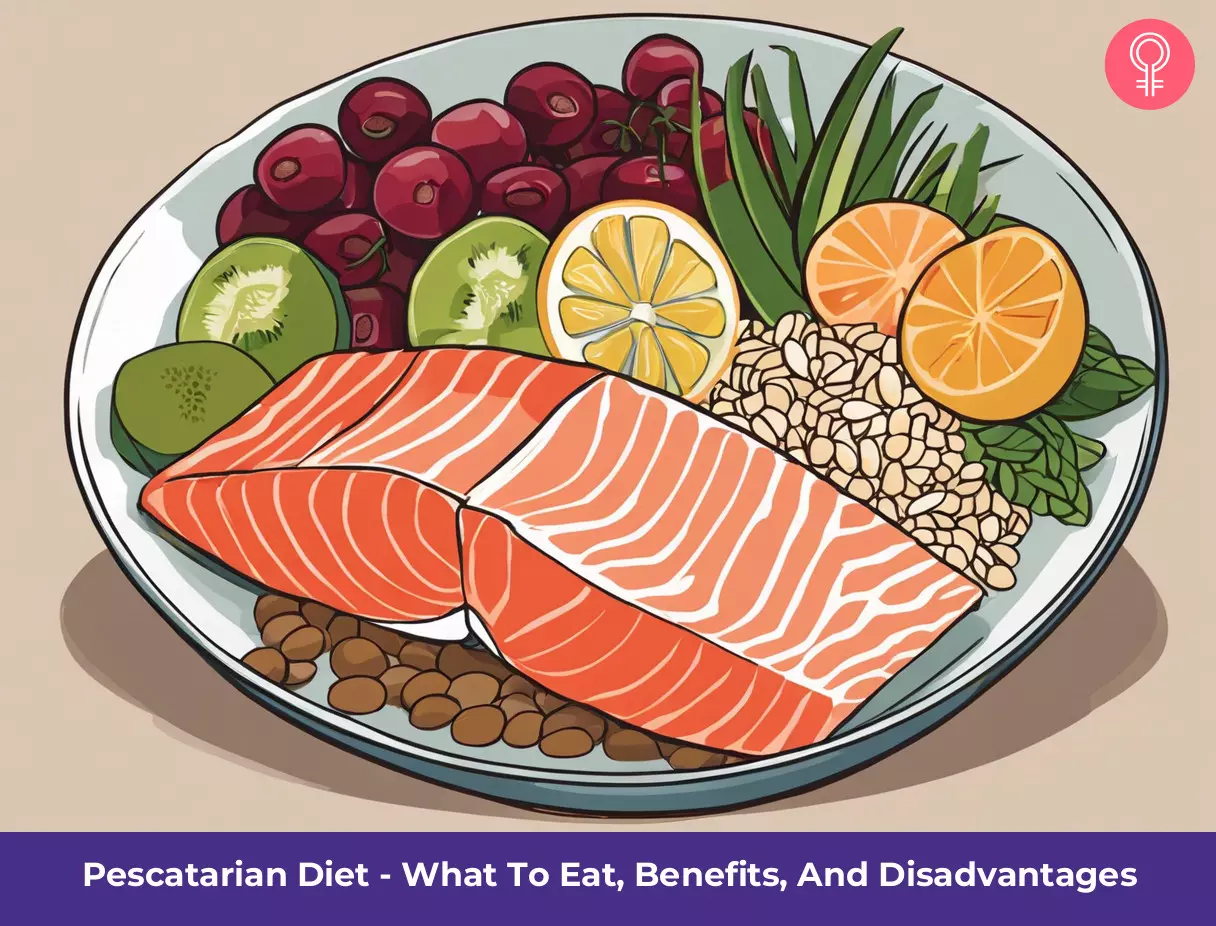Irrespective of the reason, a diet consisting mainly of plant-based foods has various health benefits, and seafood addition may enhance them. In this article, we will look at these benefits along with what you should eat and avoid while on a pescatarian diet. Keep reading!
What Is A Pescatarian Diet?
A pescatarian diet combines a vegetarian diet with fish and seafood. It is a sustainable diet and excludes other meats like poultry, beef, and pork. A person following this diet mainly consumes plant-based foods like vegetables, fruits, grains, and legumes while incorporating fish and seafood for protein and essential Omega-3 Fatty Acidsi Healthy, polyunsaturated fats in foods like fish, flaxseeds, and walnuts known for supporting heart and brain health. . However, the inclusion of eggs and dairy depends upon individual preference.
Adding fish and seafood to a vegetarian diet ensures that you get all the nutrients your body needs for proper functioning. The next section highlights the major health benefits of a pescatarian diet. Keep reading.
Health Benefits Of A Pescatarian Diet
- May Reduce Cancer Risk According to a study, a person following this diet may have a lower risk of developing Prostate Canceri A tumor of the prostate gland, a part of the male reproductive system that includes symptoms like difficulty with urination. and Colorectal Canceri A tumor that develops in the colon or rectum and is characterized by common symptoms like blood in the stool and constipation. (1). This might be due to the greater consumption of whole grains, vegetables, and fruits (2). However, further research is required in this area.
- May Help Fight Infections This diet may help fight off infections and may have a protective effect against COVID-19. According to a study published in the journal BMJ Nutrition, Prevention & Health, people who followed the pescatarian diet had 59% lower chances of getting moderate or severe COVID-19 and similar infectious conditions. This is because the diet is nutrient-dense and consists of little to no poultry and no processed meat (3).
- May Promote Heart Health The pescatarian diet is associated with a lower chance of having high cholesterol and high blood pressure, both of which increase the risk of heart problems. Fish and seafood are rich in omega-3 fatty acids that help maintain heart functions and have cardioprotective effects (4), (5). However, further studies are needed to determine optimal dosing for the same.
- May Aid In Weight Loss Fish and seafood are an excellent source of protein, which should be an essential part of your weight loss journey. They are low in saturated fats and adding them to a nutritionally balanced diet may help reduce weight (6), (7). Additionally, the diet contributes to reduced greenhouse gas emissions, making it climate-friendly (8). A pescatarian diet is not just healthy but is also manageable. Read the following section to find out what foods to eat and avoid on this diet.
Foods To Eat And Avoid On A Pescatarian Diet
A person following a pescatarian diet can eat a wide range of foods that contribute to a balanced nutrient profile for optimal health. Here is the pescatarian food list you can follow: Now that you know what exactly to buy while on this diet, discover some delicious pescatarian meal ideas in the following section for simple meal planning and preparation.
A 7-Day Pescatarian Meal Plan
Here is a sample 7-day pescatarian meal plan you can follow: Day 1 Day 2 Day 3 Day 4 Day 5 Day 6 Day 7 This pescatarian meal plan is merely a sample. It is best to consult a nutritionist to get a customized and balanced plan so that you do not miss out on important nutrients. You can also adjust it according to your dietary choices, limitations, and fitness goals. If losing a few extra pounds is your goal, check out the next section for a sample pescatarian diet plan for weight loss.
Pescatarian Diet Plan for Weight Loss
A pescatarian diet can support weight loss, as it mainly comprises nutrition-dense, plant-based foods. Here’s a sample pescatarian diet plan for weight loss with multiple food combinations for you to pick from: You can follow this diet plan or combine it with your personal pescatarian weight loss meal plan after consulting a nutritionist. While adding any pescetarian recipes to this plan, always ensure to opt for grilling, baking, steaming, and sauteing over frying. Want some food inspiration? Scroll down to see some quick, lip-smacking, and healthy pescatarian recipes you can prepare at home.
Pescatarian Diet Recipes
1. Shrimp Burrito Bowl
Ingredients
8 oz of raw jumbo shrimp ½ tablespoon of taco or fajita seasoning ½ cup of broccoli, chopped ½ radish, sliced 3-5 cherry tomatoes ½ cup of baby spinach 1 tablespoon of lime juice ½ cup of black beans, boiled ½ cup of cooked brown rice 1 tablespoon of olive oil
How To Prepare
2. Coconut Fish Curry
Ingredients
2 tablespoons of coconut oil or olive oil 5.6 oz of wild halibut 2 white onion, diced 1 tablespoon of garlic, minced 1 tablespoon of fresh ginger, grated 4 tomatoes, sliced 1 lemon 2 teaspoons of curry powder 1 teaspoon of chili powder 1 can of coconut milk 8-10 curry leaves 1 teaspoon of sea salt ½ teaspoon of pepper
How To Prepare These recipes are easy to prepare, satisfying, and delicious. The recipes are a great way to add vegetables to your diet with lean protein. In one way, the pescatarian diet is more like a lifestyle. It is quite similar to the Mediterranean and the vegetarian diet, as all three dietary patterns focus on excluding red meat and poultry. However, they are different in many aspects. The next section highlights the similarities and differences between these diets. Keep reading.
Decoding Pescatarian, Mediterranean, & Vegetarian Diets
Pescatarian Vs. Mediterranean Diet
The Mediterranean diet is inspired by the traditional eating habits of people in countries bordering the Mediterranean Sea. It favors the usage of olive oil as the primary fat source, a high consumption of plant-based foods, moderate consumption of fish and poultry, and limited consumption of red meat. The pescatarian diet shares many similarities with this diet, as both focus on fruits, vegetables, and whole grains. However, unlike the Mediterranean diet, the pescatarian diet food list does not include meat and poultry. Another key difference between both diets is the use of olive oil. While the Mediterranean diet emphasizes olive oil consumption, the oil is not a key component in the pescatarian diet. However, like the pescatarian diet, the Mediterranean diet promotes heart health (9). Since both these diets are somewhat similar and emphasize the importance of plant-based foods, choose what works best for you. If you enjoy lean chicken and do not like fish and seafood, choose the Mediterranean diet or vice versa. Whichever diet you choose, ensure it is balanced and meets your dietary requirements. You can follow the same rule while choosing between a vegetarian or a pescatarian diet, which we have compared in the following section.
Pescatarian Vs. Vegetarian Diet
The pescatarian diet has a lot in common with the vegetarian diet. Both include fruits, vegetables, nuts and seeds, whole grains, beans, and lentils, and stay away from meat. But there is a way in which the pescatarians part company from vegetarians – they eat fish and other seafood. A vegetarian or plant-based diet involves a lower intake of saturated fats, which, in turn, may help lower LDL (bad) cholesterol and reduce the risk of heart disease. It also includes foods with high dietary fiber that may help lower the risk of gastrointestinal disorders (10). Since both vegetarian and pescatarian diets are plant-based, they offer similar benefits. However, following only a plant-based vegan diet may lower the average plasma concentration of vitamin B12 (10). This is where adding fish to your diet may be beneficial. Studies state that including salmon fish protein supplements in your diet for eight weeks may help increase vitamin B12 levels (11). Both vegetarian and pescatarian diets are healthy if you follow the basic principles of including whole, nutrient-dense foods instead of fried and processed foods. If you are ethically okay with eating fish, include it in your daily diet in moderation. If not, you may always choose plant-based protein sources like tofu or consult your doctor for supplement recommendations. While the pescatarian diet has numerous health benefits and offers flexibility in meal planning and preparation, this one too, just like all other diets, has its own set of risks. Check them out in the next section.
Disadvantages Of A Pescatarian Diet
- May Increase The Risk Of Mercury Poisoning Fish and seafood carry a greater risk of mercury contamination. The symptoms of mercury poisoning are often mistaken for medical issues like gastritis and respiratory distress, leading to a wrong diagnosis. Excessive mercury exposure may have toxic effects on the body and may also damage the central nervous system and lead to coma and death (12),(13). Since children and fetuses are highly susceptible to mercury toxicity, the FDA recommends that pregnant or breastfeeding women and children should avoid consuming high-mercury fish like king mackerel and tuna. They may eat freshwater fish like pike and bass in moderation (12).
- May Not Be Ethically Sustainable Pescatarianism is often considered more ethical compared to meat and poultry based diets. However, the issues regarding fish and seafood are quite different from meat. Aquatic and marine fishes are often harvested for food production and fish farming may not be an ethical practice. There are concerns regarding the deprivation of natural behavior, breeding, etc. On the other hand, wild fishing may lead to overfishing and pose a risk to the aquatic system (14). Other than these concerns, the diet may be against people’s ethical beliefs as you are still eating animals (15). The only alternative to this is adding plant-based proteins like lentils, soy, tofu, and tempeh to your diet. Furthermore, seafood, especially wild-caught varieties that are more nutritious, can be expensive, and so can fresh foods such as vegetables, fruits, and fish(15). Always remember that it is important to consult with a healthcare professional or dietician before making significant changes to your diet. This will help you get the most out of your chosen diet while avoiding its disadvantages. The pescatarian diet is perfect for you if you want to add more protein and healthy nutrients to your plant-based diet. While the diet allows you to consume a variety of fish and seafood, keep in mind that it is not an all-fish diet. In order to make it balanced, you may have 2 to 4 fish or seafood meals per week. The remainder of your meals should be plant-based. Also, avoid sweets and processed foods if you aim to lose or maintain weight on the pescatarian diet. In addition to this, follow healthy lifestyle practices like exercising regularly, drinking adequate water, and ensuring proper sleep. Do pescatarians eat bread? Yes, pescatarians eat all types of bread including multigrain, oat-based, and whole-wheat bread. However, if you are on a pescatarian low-carb diet, avoid white bread. Which is healthier – a vegan diet or a pescatarian diet? While both vegan and pescatarian diets are healthy, studies state that vegans are at risk of developing lower concentrations of vitamins B12 and D and calcium (10). Therefore, a pescatarian diet may be considered more nutritionally balanced and healthier. Can children follow a Pescatarian diet? Yes, children may follow a pescatarian diet. However, since children are highly susceptible to mercury toxicity, they should avoid high-mercury fish like tuna and opt for freshwater fish like bass in moderation (12). Always consult a pediatrician before starting a pescatarian diet. Is a pescatarian diet suitable for athletes and active individuals? Yes, a pescatarian diet may be suitable for athletes and active individuals, as it is a well-balanced diet that includes healthy proteins (from fish and plant-based proteins like tofu) and healthy fats, fiber, vitamins, and minerals (from plant-based foods). Can I follow a pescatarian diet if I don’t like seafood? No, you cannot follow a pescatarian diet if you do not like seafood, as seafood is an integral part of this diet plan and it is impossible to follow something long-term this way. Instead, choose a diet of your preference. Is fish the only source of protein on a pescatarian diet? No, fish is not the only source of protein on a pescatarian diet. You may also consume plant and animal-based sources of protein like dairy, egg, tofu, lentils, beans, nuts, seeds, and tempeh.
Illustration: Pescatarian Diet - What To Eat Benefits And Disadvantages
Learn how to incorporate seafood into your diet for a healthier and more sustainable lifestyle with this video. Check it out and find out everything you need to know about the pescatarian diet.












